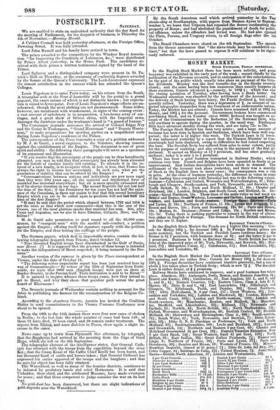Louis Napoleon is to enter Paris today, on his return
from the South. A triumphal arch at the Pont d'Austerlitz will be the portal to a grand pageant, the exact nature of which is not distinctly known ; but expecta- tion is raised to fever-point Few of Louis Napoleon's stage-effects are un- rehearsed, though the most striking are not preannounced. Some trifles, however, are mentioned with wonderment, as signs of the coming event : a vast amount of upholstery is in preparation, a handsome array of car- riages, and a great show of Sevres china, with the Imperial arms. Amongst the furniture under the workman's hand is "a guard of honour."
The Compiegne journals announce the arrival of Colonel Edgar Ney and the Count de Toulongeon' "Grand Huntsman" and "Deputy Hunts- man," to make preparations for sporting parties on a magnificent scale during Louis Napoleon's residence at the Palace.
The correspondent of the Times transmits a copy of a petition addressed by M. J. de Geste, a naval engineer, to the Senators, showing reasons against the establishment of the Empire. The document is one of great spirit and ability; the following three paragraphs will serve as a specimen of its argument and illustration.
"If you resolve that the sovereignty of the people can be thus hereditarily alienated, you may be told that that sovereignty has already been alienated for the benefit of another family still existing. To alienate it in the in- terest of a new family, is to recognize what, in fact, is true, that France has always the right to resume her sovereignty. In such case, what are the guarantees of stability, that can be offered by the Empire ? • * *
"Communications between nations and individuals are now more rapid than they were fifty years ago ; all the material and intellectual force of mankind has increaser' everywhere ; but all is more speedily exhausted and is of far shorter duration in our days. The second Republic did not last half the time of the first ; if the Presidency for ten years has not half the exist- ence of the Consulate, is there not reason to fear that this second hereditary Empire which you are to be called upon to proclaim will not last-hat the time of the first Empire ?
"It may be said that the period which elapsed between 1792 and 1814 is not the same as that which now commences-that this is the iera of the Cnsars, one of the most glorious epochs that mankind has seen. But., after Ca3sar and Augustus, are we also to have Tiberius, Caligula, Nero, and Vi- tellius ? "
• M. de Gaste asks permission to send round to all the 36,000 com- munes, by "energetic men" with the needful safe-conduct, a petition against the Empire ; offering itself for signature equally with the petition for the Empire, and thus testingthe suffrage of the people.
The German papers, which deal in improbable stories' contain the fol- lowing telegraphic despatch from Trieste, dated October 12. -"Nine thousand English troops have disembarked in the Gulf of Persia, near Herat. [!] It is supposed that the presence of these troops is intended to make the independence of Herat respected ; it being menaced by the Per- sians."
Another version of the rumour is given by the Times correspondent at Vienna, 'under the date of October 11.
"The following rather improbable report has been just received here by way of Constantinople-4 By letters of the 25th of September from Trebi- sonde, we learn that 9000 men (English troops) were put on shore at Bender-Buschir, in the Persian Gulf. Their destination is said to be Herat.' " It is natural to inquire whence these troops came, how they intend to get to Herat, and why they chose that peculiar path across the great desert of Khorassan ?


























 Previous page
Previous page